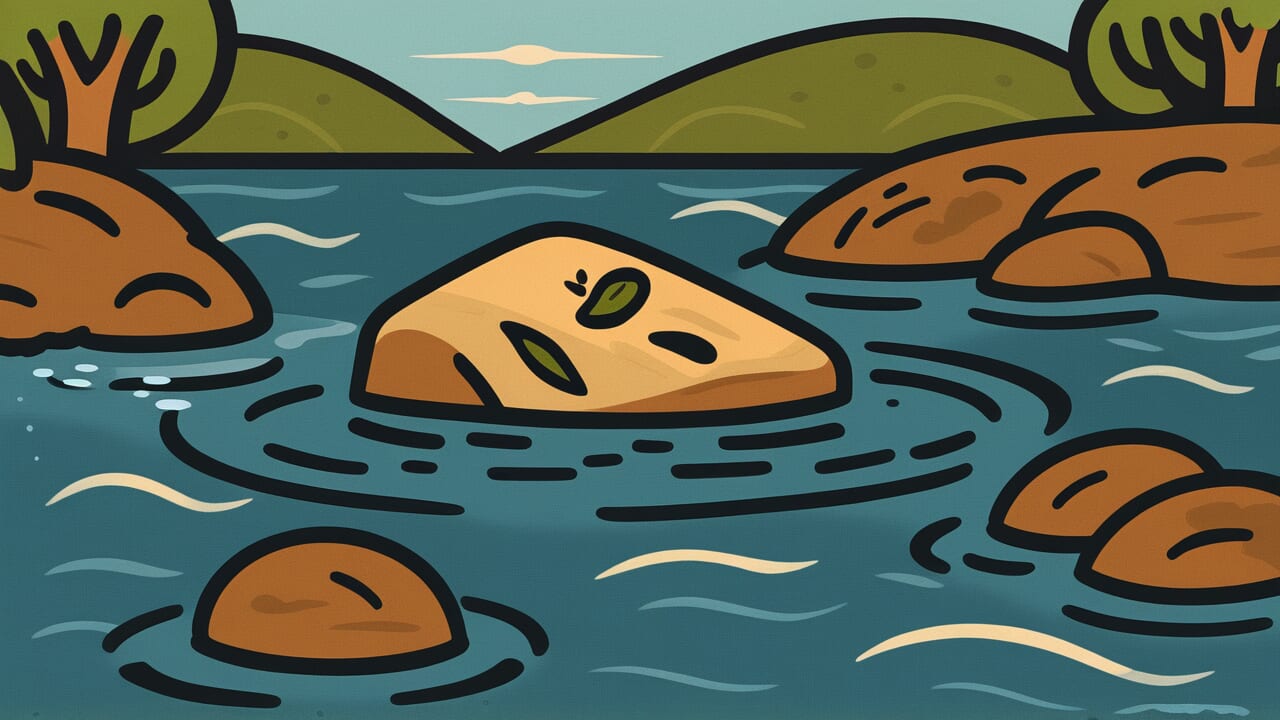How to Read “Stones flow and leaves sink”
Ishi ga nagarete konoha ga shizumu
Meaning of “Stones flow and leaves sink”
This proverb describes situations where things are completely opposite to common sense.
It refers to abnormal circumstances where the natural order and logic have been totally reversed.
Heavy stones flowing in water and light leaves sinking are phenomena that defy natural laws.
This imagery expresses situations where the world’s logic doesn’t work or where abilities and positions are reversed from what they should be.
People use this proverb when capable individuals aren’t valued while incompetent ones are promoted.
It also applies when correct things are denied and wrong things are accepted as normal.
The saying criticizes unreasonable reversals in society.
Even today, people use it to criticize situations in organizations or society where ability and position are reversed.
When you want to emphasize the absurdity of the world or abnormal situations where common sense doesn’t apply, this striking metaphor works effectively.
Origin and Etymology
The exact source of this proverb has several theories.
Scholars suggest it may come from Japanese classical literature or Buddhist tales.
The structure contrasts two phenomena that contradict natural principles: stones flowing and leaves sinking.
Normally, stones sink in water because they’re heavy, and leaves float because they’re light.
By depicting this obvious natural law reversed, the proverb emphasizes how abnormal a situation is.
This contrasting expression is a traditional Japanese rhetorical technique.
Placing opposite events side by side creates a stronger impression.
Some theories connect it to Buddhist concepts of cause and effect.
In Buddhism, reversed natural phenomena were used as metaphors to express disrupted order.
After the Heian period, when ideas about the decline of Buddhist law spread, people symbolically spoke of nature-defying phenomena to lament social disorder.
Similar expressions appear in Edo period proverb collections.
This suggests the saying has at least several hundred years of history.
Common people likely used it widely to express the unreasonableness of the world and situations where common sense didn’t apply.
Usage Examples
- That company makes personnel decisions like stones flow and leaves sink, so talented people keep quitting one after another
- The current political situation is exactly like stones flow and leaves sink, where reasonable discussions don’t get through at all
Universal Wisdom
This proverb has been passed down through generations because it touches on a universal truth.
The truth is that “reversed absurdity” always exists in human society.
In every era, we see phenomena where ability and recognition don’t match.
We repeatedly encounter situations where justice isn’t rewarded and injustice prospers.
Humans instinctively seek fairness and order.
We want a world where those who work hard are rewarded and righteous people are recognized.
But in reality, power, position, luck, and timing sometimes create evaluations different from true value.
This gap between ideal and reality brings people deep disappointment and anger.
What’s interesting is that this proverb isn’t just a lament.
It also serves as a warning about abnormal situations.
The state where stones flow and leaves sink defies natural principles.
This means such situations won’t last long and should eventually return to normal.
The saying contains hope as well.
Our ancestors tried to view absurd reversals objectively by comparing them to natural laws.
Rather than just getting emotional, they observed situations calmly and maintained sight of how things should be.
This proverb teaches us the importance of keeping correct judgment standards, especially when the world seems crazy.
When AI Hears This
When you think about stones flowing and leaves sinking thermodynamically, this isn’t just a “rare event.”
It’s a situation that goes against the flow of time itself in the universe.
In physics, we measure “degree of disorder” using a concept called entropy.
When you drop ink into a glass of water, it naturally spreads and dilutes.
This is entropy increasing.
Conversely, ink molecules scattered throughout a room naturally gathering in one place isn’t impossible in probability.
But that probability is astronomically low, like one in 10 to the power of dozens.
The phenomenon of stones flowing has the same structure.
Dense stones sink because water molecules and stone molecules settle into their most energetically stable arrangement.
This is the state of highest entropy.
For stones to float on water, water molecules must maintain a special arrangement continuously.
This is an ordered state, meaning low entropy.
In nature, order naturally collapses and moves toward disorder.
The reversal shown in this proverb is like watching a movie played backwards.
If you see footage of a broken cup naturally becoming whole or spilled milk returning to the bottle, anyone would notice “time is running backwards.”
In other words, a world where stones flow is a world where time’s arrow points the opposite direction.
The second law of thermodynamics doesn’t just explain how things move.
It also answers the fundamental question of why time flows in only one direction.
Lessons for Today
This proverb teaches modern people how to maintain their mindset when facing absurd situations.
When unreasonable evaluations or reversals happen around you, your value hasn’t changed.
Stones remain stones, and leaves remain leaves.
Even if the flow temporarily changes, the essence stays the same.
What matters is not being swept away by abnormal circumstances around you.
Keep your own value standards intact.
Even when the world seems upside down, continue walking the path you believe is right.
Keep developing your abilities, maintain your integrity, and pursue essential values.
In the long run, this attitude will surely be rewarded.
Also, if you’re in a position to evaluate others, this proverb becomes an important warning.
Ask yourself constantly: Are you judging only by superficial impressions or temporary results?
Are you overlooking truly important qualities?
Having the eye to distinguish stones from leaves is the first step in creating healthy organizations and societies.



Comments